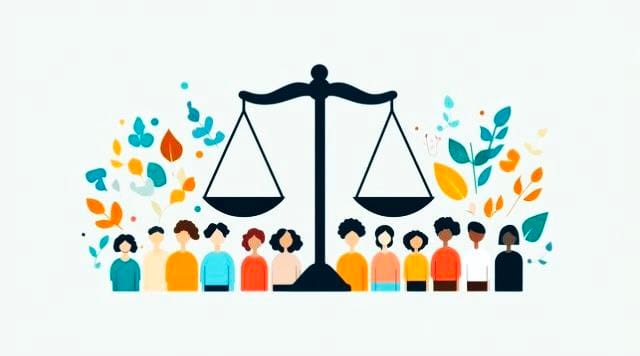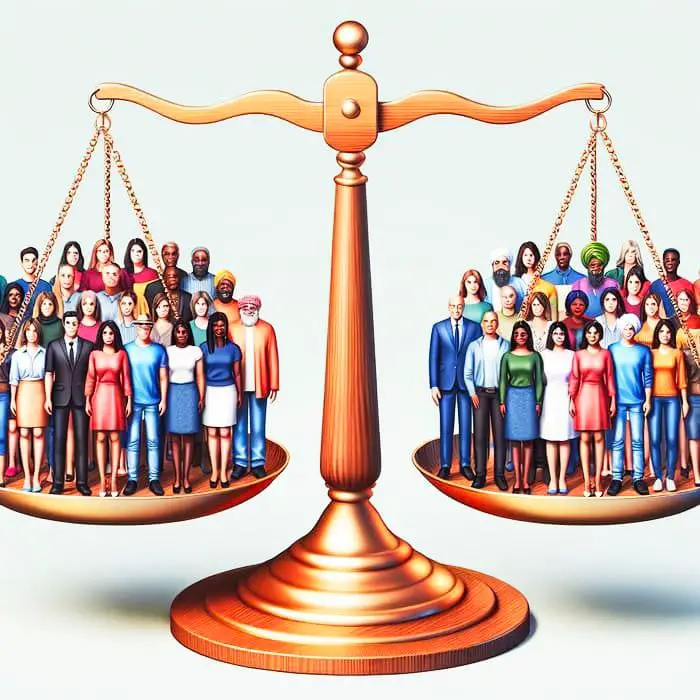
Rights: Meaning and Types
Rights are fundamental entitlements or freedoms that individuals have, which are either protected by law, recognized by social norms, or grounded in moral principles. They allow people to act in certain ways or to be treated in certain ways by others and by the state. Rights are essential for ensuring human dignity, freedom, and justice, serving as a foundation for laws and ethical frameworks within societies.

Meaning of Rights
Rights represent legitimate claims that individuals can make upon others, society, or the government. They are considered necessary for living a life of dignity, respect, and freedom. Rights protect individuals from undue interference, guarantee freedoms, and ensure that people receive fair treatment.
In political philosophy and law, rights are often discussed in relation to duties—where others (or the state) have a duty to respect or fulfill the rights of individuals. For instance, if someone has a right to freedom of speech, others have a duty not to infringe upon that right.

Types of Rights
Rights can be categorized in various ways depending on their origin, scope, and the kind of protection they offer. Below are some common categories of rights :
1. Natural Rights (Moral Rights)
- Meaning: These are rights that individuals possess by virtue of being human. They are often seen as inherent and inalienable, meaning they cannot be given away or taken away.
- Example: The right to life, liberty, and the pursuit of happiness (as declared in the U.S. Declaration of Independence) are examples of natural rights.
- Philosophical Foundation: Thinkers like John Locke argued that natural rights are universal and based on natural law. They exist prior to the formation of governments, and governments are formed to protect these rights.
2. Legal Rights
- Meaning: These are rights granted and protected by the laws of a particular society. Legal rights can vary from country to country and are enforceable through legal systems.
- Example: The right to vote, the right to a fair trial, and property rights are examples of legal rights, codified and protected by the laws of a state.
- Philosophical Foundation: Legal positivists, like H.L.A. Hart, argue that rights derive from the laws enacted by political institutions.
3. Human Rights
- Meaning: Human rights are universal rights that apply to all human beings, regardless of nationality, race, gender, or any other status. They are often seen as inalienable and indivisible.
- Example: The right to freedom from torture, the right to education, and the right to free expression, as outlined in international human rights documents such as the Universal Declaration of Human Rights (UDHR).
- Philosophical Foundation: These rights are based on the inherent dignity and worth of every person, as recognized by international agreements and declarations.
4. Civil and Political Rights
- Meaning: Civil and political rights are rights that protect individual freedoms and ensure participation in the political life of the state without discrimination.
- Example:
- Civil Rights: Right to free speech, freedom of religion, freedom of assembly, and the right to privacy.
- Political Rights: Right to vote, right to run for public office, and right to participate in the political process.
- Philosophical Foundation: Often grounded in democratic principles and the idea of personal liberty, as seen in liberal political theory.
5. Economic, Social, and Cultural Rights
- Meaning: These rights focus on ensuring basic standards of living and protecting individuals’ ability to participate in the economic, social, and cultural life of their community.
- Example:
- Economic Rights: Right to work, right to fair wages, and right to an adequate standard of living.
- Social Rights: Right to healthcare, right to education, and right to social security.
- Cultural Rights: Right to participate in cultural life, right to enjoy one’s culture, and protection of minority languages.
- Philosophical Foundation: Often associated with socialist or welfare state ideologies, and endorsed in international agreements like the International Covenant on Economic, Social, and Cultural Rights (ICESCR).
6. Group Rights (Collective Rights)
- Meaning: These are rights held by groups rather than by individuals, often focusing on the rights of specific communities or minorities.
- Example: The right of indigenous peoples to preserve their culture, the right to self-determination, and the right to use a shared language.
- Philosophical Foundation: Group rights recognize that some rights need to be protected for specific groups to preserve their identity, culture, or autonomy. They can complement individual rights by protecting collective interests.
7. Positive and Negative Rights
- Positive Rights: These are rights that require action or provision by the government or society to fulfill. They are often referred to as “rights to something”.
- Example: Right to education, right to healthcare, and right to housing. The state has a duty to provide these services to ensure the right is fulfilled.
- Negative Rights: These are rights that require others (or the government) not to interfere with an individual’s freedoms. They are often referred to as “rights from something”.
- Example: Right to free speech (freedom from censorship), right to privacy (freedom from intrusion), and right to freedom of religion (freedom from state interference in religious practices).
8. Constitutional Rights
- Meaning: These are rights specifically granted and protected by a nation’s constitution. They often form the highest legal protection of individual freedoms and cannot be easily altered by regular legislation.
- Example: In the United States, the Bill of Rights guarantees rights such as freedom of speech, freedom of religion, and the right to a fair trial. Other examples include the right to equality and non-discrimination in many constitutions.
9. Property Rights
- Meaning: Property rights refer to the legal rights to acquire, own, use, and transfer property. These rights are crucial for economic systems based on private ownership and capitalism.
- Example: The right to own land, personal belongings, intellectual property, and other assets.
- Philosophical Foundation: Classical liberal thinkers like John Locke argued that property rights are fundamental to individual liberty and autonomy.
10. Environmental Rights
- Meaning: Environmental rights refer to the rights of individuals and communities to live in a safe and healthy environment. This includes access to clean air, water, and food, and the protection of natural resources.
- Example: The right to clean water, the right to live in an environment free from pollution, and the right to environmental justice.
Conclusion –
Rights are essential for protecting individual freedoms and ensuring justice, equality, and human dignity. They can be classified into various types, such as natural rights, legal rights, human rights, civil and political rights, economic and social rights, group rights, and positive and negative rights. These categories reflect the diverse ways in which rights function to protect individuals, enable participation in society, and ensure fairness across different contexts. The recognition and enforcement of rights are central to maintaining a just and equitable society.






